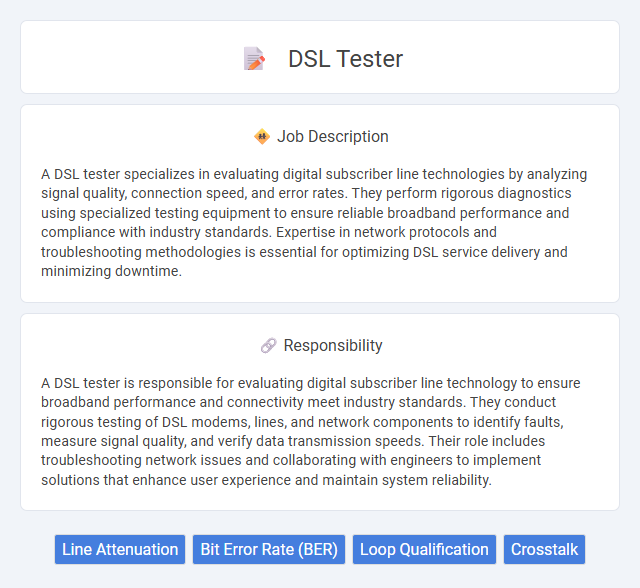
A DSL tester specializes in evaluating digital subscriber line technologies by analyzing signal quality, connection speed, and error rates. They perform rigorous diagnostics using specialized testing equipment to ensure reliable broadband performance and compliance with industry standards. Expertise in network protocols and troubleshooting methodologies is essential for optimizing DSL service delivery and minimizing downtime.
Individuals with strong analytical skills and a keen attention to detail are likely to be well-suited for a DSL tester job, as the role demands precise identification and troubleshooting of digital subscriber line issues. Candidates who enjoy working with technology and have patience for repetitive testing processes might find this position fitting. Those lacking technical knowledge or interest in meticulous problem-solving could struggle to adapt to the job's requirements.
Qualification
A DSL tester must possess strong knowledge of digital subscriber line technology, network protocols, and communication standards such as ITU-T G.993.2 and G.992.1-5. Proficiency in using testing tools like EXFO, Tektronix, and Wireshark to identify and troubleshoot DSL line issues is essential. Candidates typically require a background in telecommunications engineering or computer science along with hands-on experience in DSL diagnostics and performance analysis.
Responsibility
A DSL tester is responsible for evaluating digital subscriber line technology to ensure broadband performance and connectivity meet industry standards. They conduct rigorous testing of DSL modems, lines, and network components to identify faults, measure signal quality, and verify data transmission speeds. Their role includes troubleshooting network issues and collaborating with engineers to implement solutions that enhance user experience and maintain system reliability.
Benefit
Working as a DSL tester likely offers the benefit of gaining specialized technical skills in digital subscriber line technology, enhancing employability in telecommunications. The role probably provides experience in troubleshooting and optimizing network performance, which may lead to career advancement opportunities. Furthermore, exposure to emerging DSL innovations could result in staying current with industry trends, increasing job security.
Challenge
The DSL tester job likely presents challenges related to diagnosing complex signal issues and ensuring compatibility across diverse network configurations. Problem-solving skills probably play a crucial role in identifying subtle faults that affect connectivity and data transmission speeds. The role may demand continuous adaptation to evolving technology standards and troubleshooting methodologies to maintain optimal DSL performance.
Career Advancement
A DSL tester position offers a pivotal role in telecommunication quality assurance by ensuring digital subscriber line services meet performance standards. Mastery in DSL testing tools and protocols enhances expertise, paving the way for advancement into senior quality engineer or network analysis roles. Continuous skill development in emerging broadband technologies significantly increases opportunities for leadership positions within telecom engineering teams.
Key Terms
Line Attenuation
A DSL tester specializes in evaluating the quality of digital subscriber lines, with a primary focus on measuring Line Attenuation to determine signal loss over the cable. Accurate assessment of Line Attenuation values helps diagnose connectivity issues and ensures optimal data transmission speeds, essential for maintaining broadband performance. Expertise in using advanced DSL testing tools facilitates precise identification of faults and supports effective network troubleshooting and maintenance.
Bit Error Rate (BER)
DSL testers play a critical role in measuring the Bit Error Rate (BER) to ensure data integrity over digital subscriber lines. Accurate BER testing detects transmission errors, enabling technicians to diagnose line quality issues and optimize signal performance. Maintaining low BER levels is essential for reliable DSL connectivity and enhanced customer satisfaction.
Loop Qualification
DSL tester professionals specialize in Loop Qualification, a critical process that assesses the integrity and performance of copper telephone lines for Digital Subscriber Line (DSL) services. They utilize advanced diagnostic tools to measure line attenuation, noise margin, and crosstalk interference, ensuring the loop meets service provider standards for high-speed internet delivery. Expertise in interpreting test results enables DSL testers to identify faults, optimize bandwidth capacity, and improve overall network reliability.
Crosstalk
A DSL tester specializing in crosstalk analyzes interference between adjacent DSL lines to ensure optimal signal quality and minimize data transmission errors. Using advanced diagnostic tools, they identify crosstalk patterns and implement corrective measures such as line adjustments or filtering techniques. Their expertise is crucial for maintaining network stability and enhancing broadband speeds in densely packed communication infrastructures.
 kuljobs.com
kuljobs.com